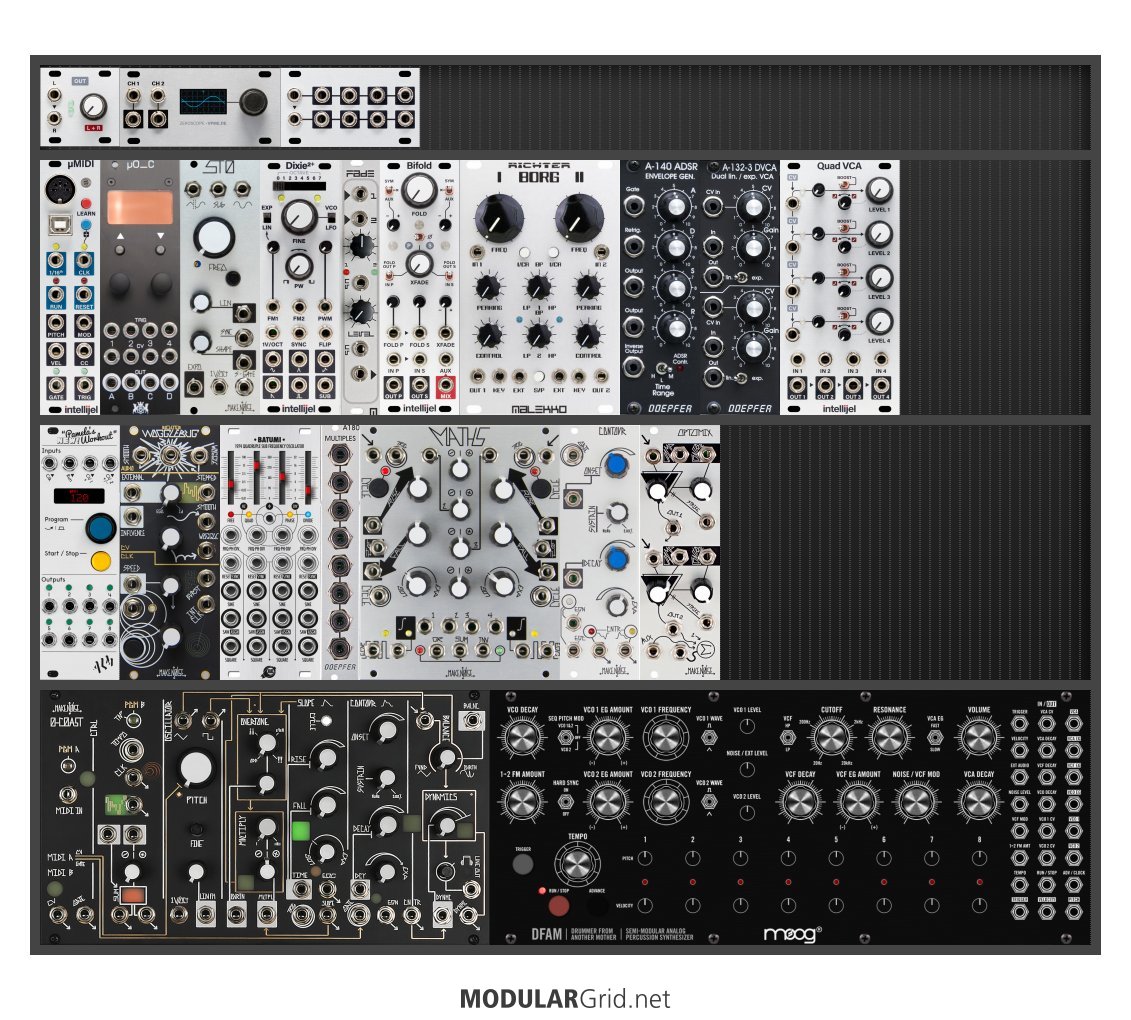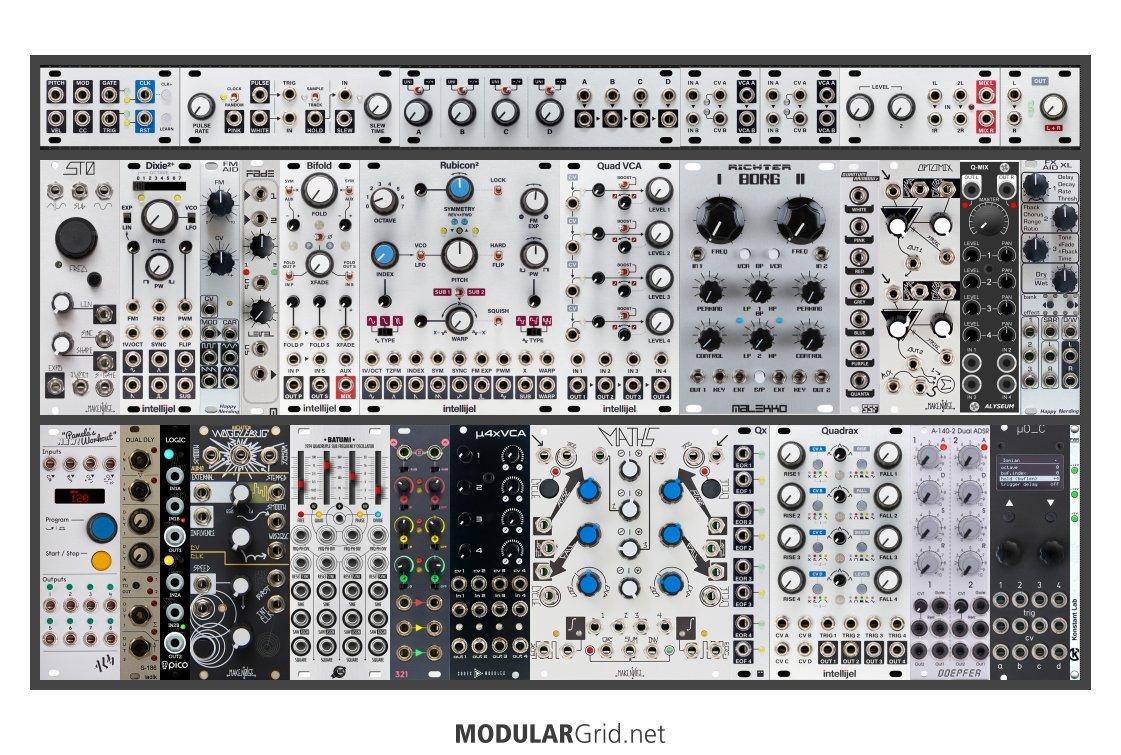You're going to have problems. The idea that anyone can just step up and create a build that can work on styles from one end of the spectrum to the other is pretty much a fallacy, unless you're up for something in the 4 x 168 zone. This is because the modules that work well for, say generative music really aren't likely to be the ones that'll do the same for synthpop. Mind you, there ARE exceptions...but as I noted, this isn't something that can easily be done even WITH extensive experience. Anyway, the result is that you'd need a BIG system in order to house and power all of the modules that you WON'T be using on one project or another. So unless you've got piles of ca$h, I'd suggest you either try and find a "lane" for this build to drive in, or try and put together something rather basic that you can use with external processing. Except for generative...it's very much a "special case", and requires more than usual in terms of modulation and modulation pick-off modules to create the complex-order control needed for that.
Secondly, you mention that this should be in a 7u cab. I don't see that here. What I DO see, however, is a huge no-no on that bottom row. If you have something that's in a case, and that gets powered by that case, LEAVE IT IN THAT CASE unless you have some urgent, must-do rationale for putting it in the Eurorack cab. For one thing, it kills space that needs to be there for modules that have NO power and NO case. Secondly, once you factor in the cost of housing and powering those devices TWICE, you'll find that you're paying considerably more for the 0-Ctrl and DFAM than you paid when you bought 'em. Anyway, without a tile row in the layout, you're going to have some problems working out the configuration for it.
Now, as for that "complex oscillator" idea...it's not bad. My AE system has six of these sorts of assemblages, consisting of two basic digital oscillators, two VCAs, two full VCOs, a 4-in mixer, and a wavefolder. They work. But with AE's prices, they're very doable. Now, the price for your configuration comes out to $767 and it takes up 28 hp. However, this: https://www.modulargrid.net/e/make-noise-dpo-white-knobs ...is a Make Noise DPO, which is a fo-realz, no-foolin' complex oscillator based on typical Buchla signal flow concepts. And it costs $599, which comes out to $168 LESS. Clearly, the way you've implemented this isn't the right way to proceed unless, like I said before, piles of ca$h, etc.
Stop. Stop right now. You need to take some deep, cleansing breaths and have a seat.
For one thing, NO ONE AT ALL, EVER, EVER, EVER, EVER comes onto Modulargrid and whips out a perfect first build. It doesn't happen. Period. Even if you've got extensive experience in synthesis, there is simply too much here to process rapidly, especially in Eurorack. Secondly, there's some major differences between prebuilt (even patchable) synths and true modular architecture, most notably in that you can totally define your instrument and tailor it for your music's needs. But that's a double-edged sword, tbh...mainly because, if you don't know that your music has a "deficiency" that modular SPECIFICALLY can correct, you're more apt to build a hella expensive closet-warmer.
Instead of continuing down a path that WILL result in the horrific detonation of your Magic Plastic, I suggest...
1) Spend time on here studying other, more experienced users' builds. Just go through there, and when you see a name you recognize from their work (and you will!), see how and why they do what they're doing. Gradually, you'll start to notice certain patterns in module complements, signal flow, ergonomics, etc.
2) Get a copy of VCV Rack. VCV is a software emulator for Eurorack (more or less) and contains a huge range of module emulations, some of which are 1:1 software takes on existing Eurorack hardware (Mutable, Instruo, et al). Mind you, it doesn't like to run on underpowered systems, so keep that in mind (and change your computer's power profile to "maximum performance", however you do that on the OS you use)...but that's more or less the sole drawback. You'll find everything at https://vcvrack.com/
3) After that, proceed SLOWLY. Make a build. Remake it. Then remake the remake, and so on. Work toward a refined end-result, not a fast slap-together; Modulargrid ain't a video game, and trying to "speed-run" it will invariably end in disaster, especially when first starting in modular system design. There are simply far more potential "errors" than proper solutions on MG, depending on what you're trying to do. And...
4) Avoid "sexy module syndrome". Yeah, I know...lots of blinkenlichts und tvistenknobs LOOKS cool AF, but unless you make sure to put the right "boring stuff" (VCAs, attenuverters, timing modifiers, etc etc etc) into the build in the right proportions and of the right types, you're guaranteed to wind up with a very expensive albeit pretty to look at noisemaker. The build above is already well on its way to that disastrous end-result, so...yeah, stop. Get to know the right "whats" and "whys" FIRST, and THEN go back to setting up a build that you can whittle into a fine final result. It's very doable, but it doesn't involve instant gratification...and if you've worked with music for any length of time, you should know better than to try and look for that illusion, as it simply doesn't exist. Or rather, it DOES...but the "gratification" only lasts for as long as you're unaware of the mistakes.



